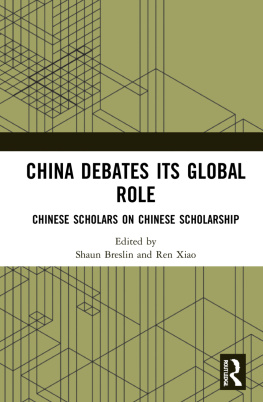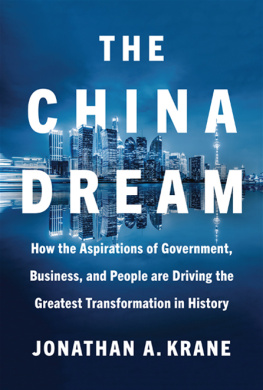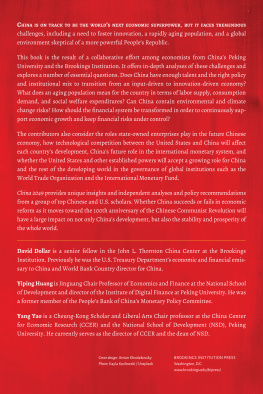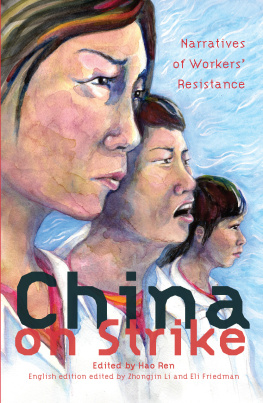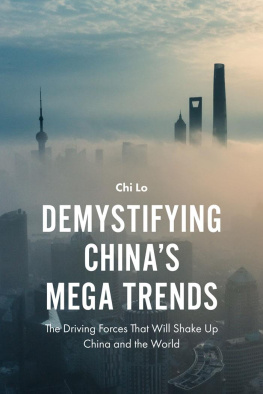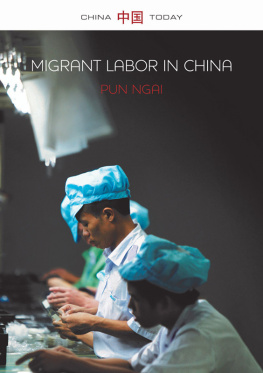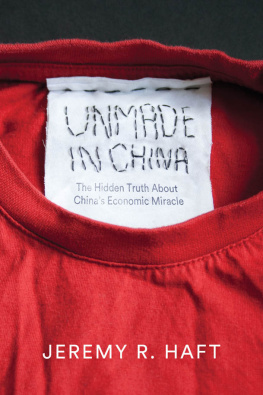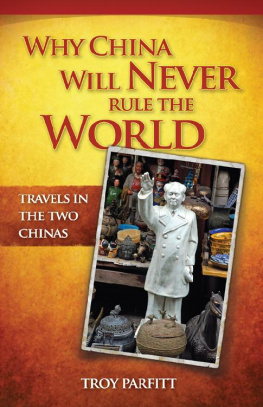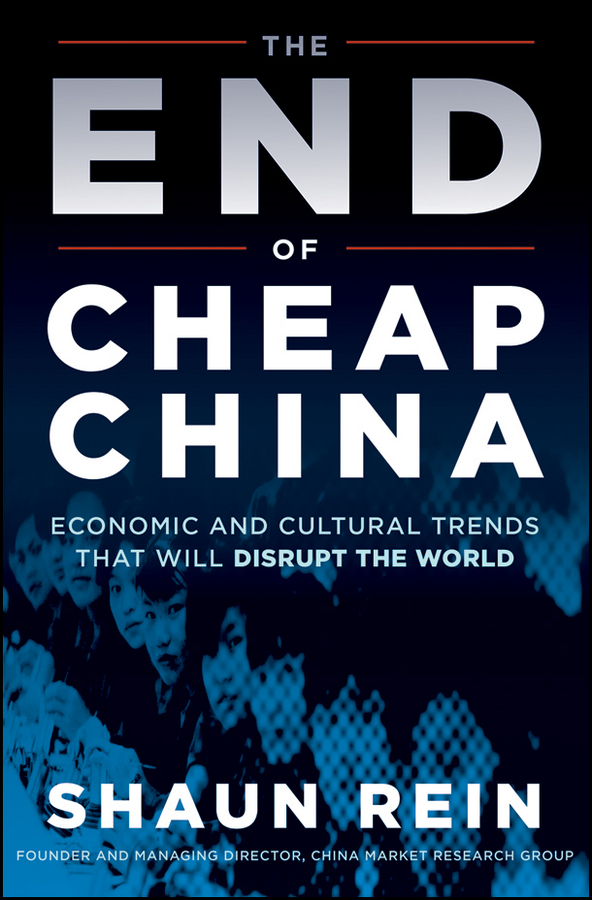CONTENTS

Copyright 2012 by Shaun Rein. All rights reserved.
Published by John Wiley & Sons, Inc., Hoboken, New Jersey.
Published simultaneously in Canada.
No part of this publication may be reproduced, stored in a retrieval system, or transmitted in any form or by any means, electronic, mechanical, photocopying, recording, scanning, or otherwise, except as permitted under Section 107 or 108 of the 1976 United States Copyright Act, without either the prior written permission of the Publisher, or authorization through payment of the appropriate per-copy fee to the Copyright Clearance Center, Inc., 222 Rosewood Drive, Danvers, MA 01923, (978) 750-8400, fax (978) 646-8600, or on the web at www.copyright.com . Requests to the Publisher for permission should be addressed to the Permissions Department, John Wiley & Sons, Inc., 111 River Street, Hoboken, NJ 07030, (201) 748-6011, fax (201) 748-6008, or online at www.wiley.com/go/permissions .
Limit of Liability/Disclaimer of Warranty: While the publisher and author have used their best efforts in preparing this book, they make no representations or warranties with respect to the accuracy or completeness of the contents of this book and specifically disclaim any implied warranties of merchantability or fitness for a particular purpose. No warranty may be created or extended by sales representatives or written sales materials. The advice and strategies contained herein may not be suitable for your situation. You should consult with a professional where appropriate. Neither the publisher nor author shall be liable for any loss of profit or any other commercial damages, including but not limited to special, incidental, consequential, or other damages.
For general information on our other products and services or for technical support, please contact our Customer Care Department within the United States at (800) 762-2974, outside the United States at (317) 572-3993 or fax (317) 572-4002.
Wiley publishes in a variety of print and electronic formats and by print-on-demand. Some material included with standard print versions of this book may not be included in ebooks or in print-on-demand. If this book refers to media such as a CD or DVD that is not included in the version you purchased, you may download this material at http://booksupport.wiley.com . For more information about Wiley products, visit www.wiley.com .
Library of Congress Cataloging-in-Publication Data:
Rein, Shaun, 1977
The end of cheap China : economic and cultural trends that will disrupt the world /Shaun Rein.
pages cm
ISBN 978-1-118-17206-3 (cloth); ISBN 978-1-118-22786-2 (ebk); ISBN 978-1-118-23994-0 (ebk); 978-1-118-26455-3 (ebk)
1. ChinaEconomic conditions21st century. 2. ChinaSocial conditions21st century. 3. ChinaCommerce. 4. LaborChina. 5. Costs, IndustrialChina. 6. Consumption (Economics)China. I. Title.
HC427.95.R447 2012
330.951dc23
2011045221
Tom Tom,
May life bring you many bright lights.
Love, Ba Ba
PROLOGUE
The year was 1998. Steve Jobs was years away from introducing the iPod to the world, and audiences were packing cinemas across the globe to see Leonardo DiCaprios love affair with Kate Winslet in Titanic .
I turned off the lights in my grubby hotel room in Changchun, a dingy industrial city in northeast China famous for being the capital of Manchukuo, the Japanese-controlled puppet state during World War II. I had been sitting upright on a hard, wooden train seat for 18 hours all the way from Tianjin, and my back ached. The rooms air conditioner unit wheezed loudly, and a potent mixture of smells emanated from the bathroom, but I was so exhausted I started to drift off to sleep anyway.
Then the calls started.
The first time I answered, a giggly, cutesy voice on the other end playfully asked, Do you want some fun? I knew what fun meant. No, I told the voice, not my style, and I hung up. Undeterred, the girlish voice kept calling back every five minutes. Do you want some comfort? she cooed. I hung up. The phone rang again. Do you have any aches I can massage away?
I fumbled around in the dark trying to disconnect the phone, without success. Finally I ripped the phone out of the socket. It was damaged, but I figured Id just settle up with the hotel manager the next dayafter all, everything in China then was cheap.
Then there was a knock on the door. I opened it, and standing in front of me was an absolutely stunning girl. She had a slender, lithesome body, mesmerizing coal-black eyes, and a perky nose. Her hair flowed in dark waves to her shoulders, and she wore a deep-blue cocktail dress that hinted amply at what was underneath but didnt reveal too much. A fruity perfume scent hung in the air around her. I remember thinking how gorgeous she was. She easily could have been a cover model for a fashion magazine, maybe Teen Vogue .
She smiled. Twenty dollars, she said, and mimed with her hand and mouth what that amount would buy me. Then she told me what 25 bucks would get. I stared at her blankly for a few moments, sweat beading up on my palms and brow, finally said no, and crawled back to bed alone. Seemingly as soon as I started to drift off again, the knocks started again. It was the start of a long, lonely, sleepless night.
When I first arrived in China in the mid-1990s to study Chinese at Nankai University, gorgeous young prostitutes like the one that stood at my door in Changchun that night were everywhere. They were in hotels, saunas, karaoke bars, even coffee shops. They would sit, elegantly, waiting for traveling businessmenmostly middle-aged white foreigners with bulging gutsand saunter over to them to make their pitch for a little comfort. They were easy to spot because, unlike most of the rest of the population that dressed in conservative matronly old clothes, they carried Motorola mobile phones and Louis Vuitton bags. What amazed me was that practically all of them were dazzlingly beautiful.
Now, 15 years later, as the founder of China Market Research Group (CMR), a market research firm that helps companies as varied as Apple, Kentucky Fried Chicken, Richemont, LG Electronics, and DuPont develop their strategies for China, I have witnessed a total turnaround in the labor pool and how people dress and eat.
No longer do you find gorgeous prostitutes everywhere. On a trip to Beijing in 2011, I stayed at one of the ritziest hotels in the capital. Glancing around the lobby, I could still spot the hookers easily enough, only now they were middle aged and ugly. They wore too much makeup and had paunches like many of the aging Western businessmen they serviced. As I stood in the elevator on the way up to my room, I realized I couldnt remember the last time Id received a call at night in a hotel room, and that it was becoming rare to even be approached by a hooker. What had happened?
The explanation is simple enough. In the mid-1990s, job opportunities were scarce in China, so even the most beautiful young girls were desperate enough to work as prostitutes, selling their bodies to feed themselves and send money home to their families in the countryside. But Chinas economy and job market have seen dramatic changes in the past decade and a half. As more attractive, better-paying job opportunities increased, pretty young girls took advantage of better options, and the pool of prostitutes got uglier as a result. The uglification of Chinese prostitutes is part of a broader trend that is the subject of this book, The End of Cheap China .


